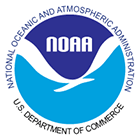
Credit: NOAA/JPL-Caltech
What do you think it is?
- Is science just another school subject, like math and English?
- Or, is it a bunch of information about the parts of a living cell and the temperatures at which water freezes or boils?
- Or, is it something you do in a lab, like mixing together different chemicals and heating them up to see what happens?
- Or, is it a way of looking at the world and seeing it for what it is, rather than what we might think it is or wish it to be?
Science is actually all these things . . . plus a little art and imagination. You may have learned in your science classes about the "scientific method." Scientific method is usually thought of as a series of steps that scientists follow to discover how nature works.
Someone wrote down these steps (or ones similar) a long time ago to define scientific thinking. These steps will work fine for a school science fair project. But this is not usually the way science actually happens!
Science is really a way of looking at the world—REALLY looking—and then coming up with explanations for why things are as they are. An explanation is accepted as a good scientific theory if it helps scientists correctly predict how nature will behave in the future.

Credit: NOAA/JPL-Caltech
For example, how many thousands of years did humans spend looking up at the night sky before they really saw that some of the "stars" (which were really the planets of the solar system) were in different positions every night, but were always arranged in a straight line across the sky? Science is really a way of looking at the world.It took careful observation (and good record keeping) to begin to see the pattern of the planets' movement across the sky and realize that if the Earth and planets were all orbiting the sun (rather than all the objects in the sky orbiting Earth, as had been believed), the movement of the planets could be explained-and predicted. No experiment was performed. No variables were controlled. The data gathering came way before the hypothesis (the idea that the planets orbit the sun).

Credit: NOAA/JPL-Caltech
Sometimes science happens mostly inside a scientist's head. For example, when Einstein discovered his Theory of Relativity, he did it by just thinking (and doing a lot of math, no doubt) about how nature ought to work if certain conditions were met. No experiments could be done to test his theory because the technology to test them hadn't been invented yet. Now that we do have some of these technologies, every test that anyone has done to test Einstein's theory has shown it to be correct.
Sometimes, science happens by accident. Some chemical gets spilled onto a material in a workshop or something gets overheated, and a whole new set of chemical properties are discovered. Or two scientists working on different problems get together for lunch, gripe to each other about how stuck they are, and suddenly one says something that triggers the other one suddenly see the answer.
So rather than being a tidy package of knowledge or a methodical step-by-step approach to discovery, science is more like a mystery inviting anyone who is interested to become a detective and join in the fun.




